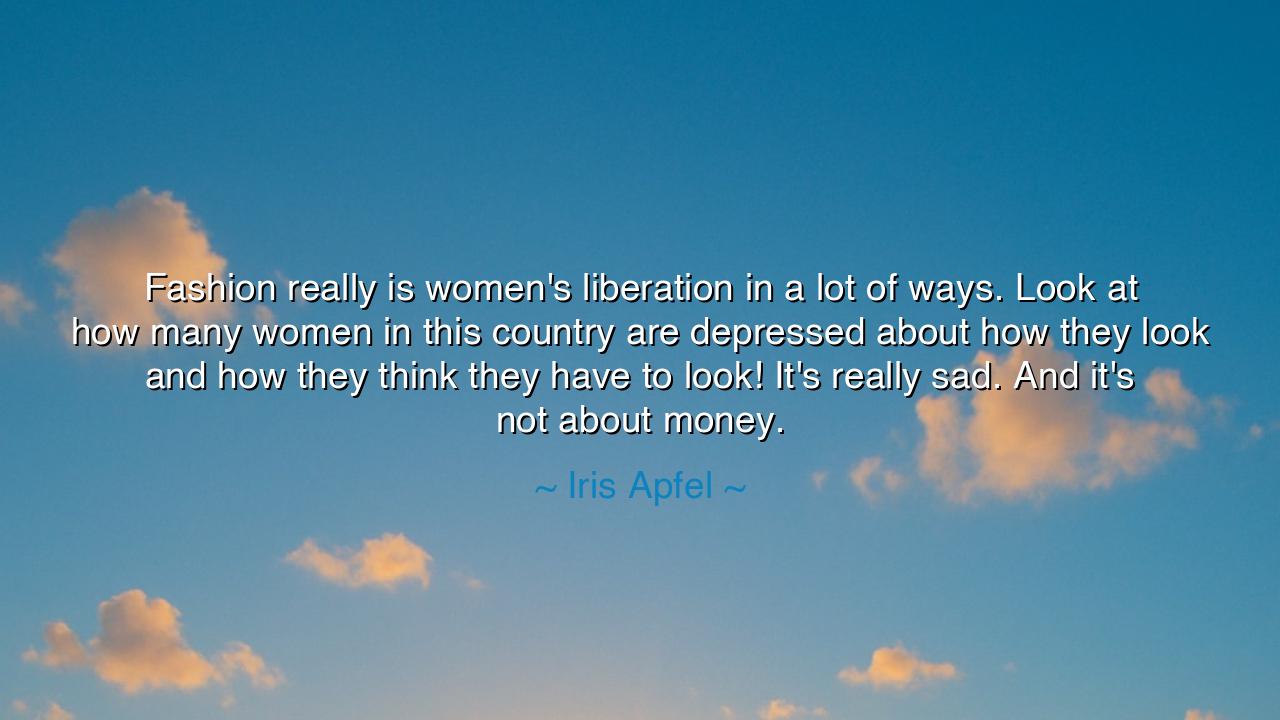
Fashion really is women's liberation in a lot of ways. Look at
Fashion really is women's liberation in a lot of ways. Look at how many women in this country are depressed about how they look and how they think they have to look! It's really sad. And it's not about money.






There is both strength and sorrow in the words of Iris Apfel, who said, “Fashion really is women's liberation in a lot of ways. Look at how many women in this country are depressed about how they look and how they think they have to look! It’s really sad. And it’s not about money.” From the mouth of a woman who lived nearly a century and witnessed the tides of style and culture rise and fall, these words ring as both warning and wisdom. Apfel speaks not of fabric and color alone, but of the deep relationship between identity and self-expression — the eternal struggle of women to be seen as more than their reflection, to dress not for approval but for freedom. Her lament is not against beauty, but against bondage disguised as fashion, against the invisible chains that bind women to an image not their own.
The origin of this quote lies in Apfel’s extraordinary life — a designer, businesswoman, and icon who made her name not through conformity but through fearless individuality. Long before the world celebrated “self-expression,” she lived it. Her enormous glasses, layered jewelry, and bold use of color were not mere eccentricities, but declarations of sovereignty: she would define herself, not be defined by others. When she speaks of fashion as liberation, she means the kind of liberation that comes from authenticity — the power to say, “This is who I am,” without apology. But she also mourns what modernity has done to that freedom: the way commercialism and comparison have turned beauty into a battlefield, and confidence into currency.
The ancients, too, understood that the adornments of the body could mirror the adornments of the soul. In the days of Athens and Rome, noble women dressed not merely for pleasure, but to signal virtue, intellect, and dignity. Yet even then, philosophers warned that appearance without substance becomes vanity, and vanity without self-awareness becomes slavery. Iris Apfel’s sorrow at seeing women depressed over how they “have to look” is the same sorrow that Socrates felt when he saw his students obsessed with wealth and status — they mistook the outer form for the inner truth. What was meant to express individuality became a tool of imitation, and imitation, when done without consciousness, erodes the spirit.
One can recall the story of Coco Chanel, another woman who turned rebellion into elegance. In the early 20th century, Chanel tore away the corsets that bound women both physically and symbolically. She gave them loose silhouettes, trousers, and black dresses that allowed movement and confidence. Her designs were not just fabric — they were freedom stitched in thread. Yet, as Apfel reminds us, even Chanel’s revolution was not immune to distortion. Over time, the industry she helped create became one of oppression once again, turning style into a race for perfection and worth. Thus, the serpent of conformity devoured its own tail, and liberation was turned once more into expectation.
Apfel’s declaration that “it’s not about money” cuts through the illusions that cloud this issue. True style, she insists, is not purchased — it is cultivated. The poor woman with imagination can possess greater elegance than the wealthy woman enslaved to trends. Fashion becomes art when it expresses the spirit; it becomes tyranny when it dictates the spirit. Her grief at the sight of women who hate their own reflections is the grief of a sage watching her people forget their power. She knows that the saddest thing is not that women feel imperfect, but that they measure their worth by standards designed to profit from their insecurity.
In her vision, fashion is not vanity but voice. It is the language of freedom — a way for women to reclaim ownership of their image, to transform fabric into statement, to turn the act of dressing into an act of self-love. When Apfel speaks of liberation, she speaks of women who choose for themselves: who wear what makes them feel alive, not what makes them acceptable. She teaches that liberation begins not in the wardrobe, but in the mind — when one no longer dresses to please the eyes of others, but to honor one’s own soul.
The lesson, my children, is profound: never allow the world to define your beauty, for your spirit is the designer of your worth. Clothes are but cloth until they are given meaning by confidence and intention. Let fashion be your servant, not your master. Choose colors that reflect your joy, shapes that free your movement, and styles that honor your truth. Do not bow to the false idols of appearance, for they will never be satisfied. Instead, dress each day as an artist dresses a canvas — not to impress, but to express.
For as Iris Apfel teaches us, liberation is not found in riches or recognition, but in the courage to be yourself in a world that profits from your doubt. The truly stylish woman is not the one adorned in jewels, but the one adorned in authenticity. And when she stands before the mirror and smiles, not because she fits the mold, but because she broke it — then, and only then, is she truly free.






AAdministratorAdministrator
Welcome, honored guests. Please leave a comment, we will respond soon